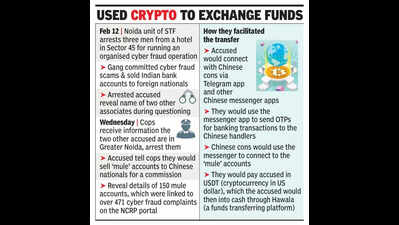- News
- City News
- noida News
- LLB student part of gang selling ‘mule accounts’ to cyber cons in China held
Trending
LLB student part of gang selling ‘mule accounts’ to cyber cons in China held
Noida: Police arrested two members of a gang that allegedly committed ‘digital arrest' fraud and sold ‘mule' bank accounts to Chinese nationals for fraudulent purposes on Wednesday. Earlier this month, cops had arrested three other members of the gang who had revealed the names of two of their associates during interrogation.
Additional Superintendent of Police, UP STF Noida unit, Raj Kumar Mishra said that, on Feb 12, cops arrested Mohan Singh alias Rocky, Sanyam Jain, and Arman for scamming Indian citizens under the pretext of ‘digital arrest'.
A case was registered at Surajpur police station and investigation revealed that the three were part of a gang that used gaming and trading applications to defraud people and provided Indian bank accounts to criminals. The money from these scams would be transferred into the accounts.
During interrogation, the accused revealed the names of two of their accomplices – Rohan Agrawal (29), a resident of Khuldabad in Prayagraj, and Harshvardhan Gupta (28), a resident of Kanpur and a LLB student. A team was formed to nab the two accused.
An FIR has been registered against the two accused under sections 318 (cheating), 338 (forgery of valuable documents), 340 (using forged documents as genuine), 61(2) (criminal conspiracy), 3(5) of the BNS, and 66D of the IT Act.
According to Mishra, Rohan met someone named Amir in Kanpur during some gambling activities. Amir provided ‘mule accounts' to Chinese nationals for a commission, and Rohan learned the same from him. Afterwards, Rohan connected with various Chinese handlers on the Telegram application and started providing them with Indian ‘mule accounts' for a hefty commission.
Rohan told police that, since Nov, 2024, a Chinese handler had transferred Rs 3.49 crore into his USDT (cryptocurrency in US dollar) wallet. "Rohan converted the USDT into cash through Hawala (a funds transferring platform). This money was distributed among those who provided the accounts," Mishra explained.
Questioning also revealed details of 150 mule accounts, which were found to be linked to over 471 cyber fraud complaints on the NCRP portal from various states, including Uttar Pradesh, Delhi, Haryana, Punjab, Telangana, Tamil Nadu, Karnataka, Kerala, Maharashtra, Madhya Pradesh, and Odisha. The accounts are accessed in hotels or public places, and funds are transferred to the Chinese handlers abroad.
Further explaining the gang's operations, police said that cons had installed a Chinese messenger application which they would use to send OTPs for banking transactions to the Chinese handlers abroad, who could then use the application programming interface (API) tool to transfer money from registered accounts. They could automatically connect with the accounts using the API to transfer funds. They then transferred this money to their other accounts and bought cryptocurrency (USDT), which was sent to the gang members in India in USDT.
End of Article
FOLLOW US ON SOCIAL MEDIA










